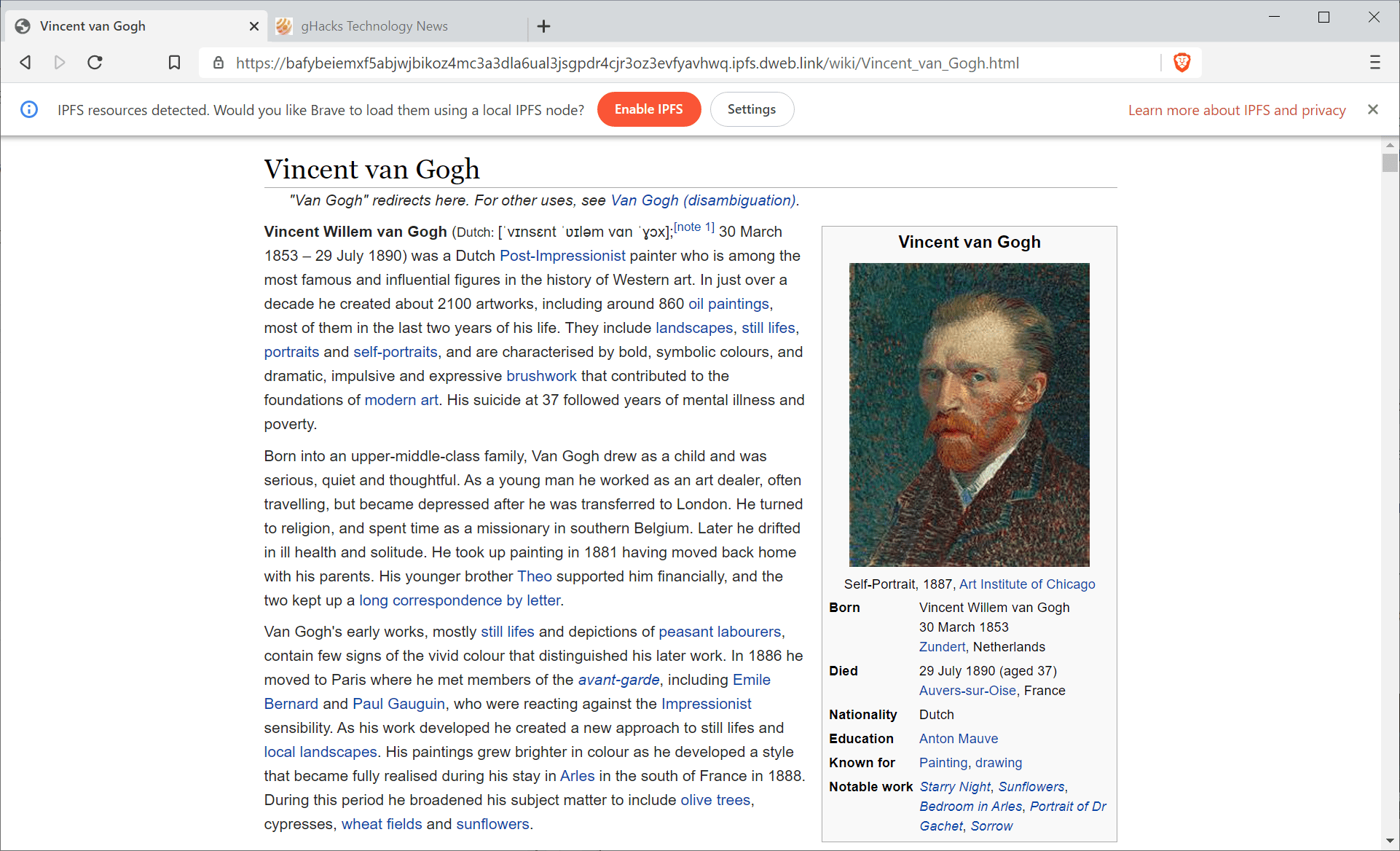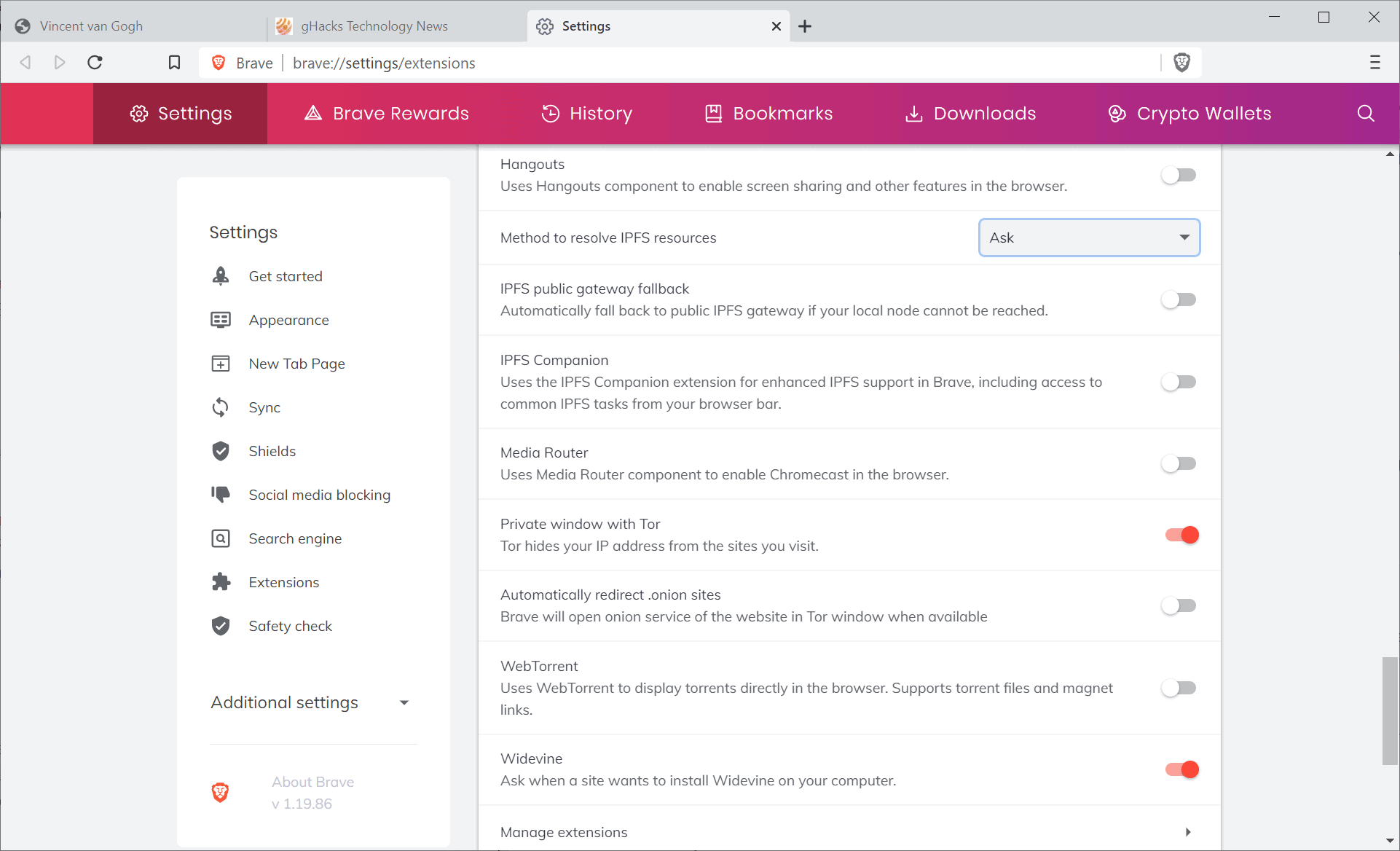Brave update introduces IPFS support, but what does that mean?

Brave released an update for the company's Brave web browser on January 19, 2021. The major feature of Brave 1.19 is support for IPFS, the Interplanetary File System protocol. Many users don't know what to make of it, probably, as IPFS is not really discussed a lot in the news.
IPFS is a peer-to-peer protocol designed specifically for decentralized access to content. The system offers a number of advantages over HTTP(s) content, including that users may access content even if the "regular" version has been censored. Nation states as well as corporations have blocked access to content in the past, e.g. to YouTube, Twitter, or Wikipedia. An IPFS version of the content could still be accessed even if regular access to the content would be blocked.
One of the main downsides to using IPFS is that content needs to be made available via the system. Some sites, Wikipedia being a prime example, support IPFS but the majority of sites online don't.

For Brave, it means that users can load addresses starting with ipfs:// directly, e.g. ipfs://bafybeiemxf5abjwjbikoz4mc3a3dla6ual3jsgpdr4cjr3oz3evfyavhwq/wiki/Vincent_van_Gogh.html would open the Vincent van Gogh entry on Wikipedia. An incomplete list of who is using IPFS already is available here.
Brave displays a notification when the first IPFS page is opened in the browser: "IPFS resources detected. Would you like Brave to load them using a local IPFS node?
The browser is configured to load IPFS content via public HTTP gateways. The address bar shows the "redirected URL on the gateway server, and not the IPFS address. Brave notes that users may want this if they don't want to load an IPFS node on the local computer, e.g. when the system has limited resources. The use of public gateways has certain implications:
- The gateway sees which content you request.
- It is theoretically possible to alter the content before it is served.
Brave plans to integrate verification of content that is served by third-parties over IPFS in a future version. A support article is available that provides additional information on privacy.
Selecting "Enable IPFS" will configure Brave to use a local node when it comes to IPFS content. If the option is selected, IPFS will be displayed in the address bar and that improves trust and removes the public middleman. Enabling IPFS will make the system a "temporary host for that content" according to Brave; users who don't want that can keep the default configuration that uses public gateways. Brave is configured to use up to 1 Gigabyte of cache for hosting content accessed via IPFS.
Configuring IPFS in Brave

- Load brave://settings/extensions in the browser's address bar.
- The configuration page displays three IPFS related options:
- Method to resolve IPFS resources. Default is ASK. You can change that to Gateway or Disabled.
- IPFS public gateway fallback. Disabled by default. Enable to fall back to a public gateway if the local node cannot be reached.
- IPFS companion. Disabled by default. Enhances support for IPFS in Brave when enabled.
Closing Words
Brave users may access IPFS content in the browser directly. Those who don't want to do that can disable the functionality entirely.
Now You: What is your take on IPFS? Have you used it in the past?






















Brave should add support for pinning, not counting toward the 1GB cache.
People dont forget IPFS is a FILE SYSTEM, not a networking system.
Sort of surprised Brave would focus on such an obscure feature? But I guess maybe they see a need for it within their user base? Thanks to Martin for explaining how it works.
@JohnIL
I think Brave is a general use browser that is non-partisan, its main audience are literally mobile users who want adblocking but do not get it on Chrome for Android. That’s literally the fastest growing group.
Anyway, I don’t think anyone will actually use IPFS in the foreseeable future, seeing how it is still in its infancy. But in general, moves towards a more decentralized web are coming from various parties (not just Brave) now, and I consider that a good thing, seeing how much power (in terms of the surveillance) the masters of the universe have amassed by now. Decentralized structures are needed to counter monopolistic overreach.
When will we have Brave Portable!!!
@Marc
Already exists:
https://portapps.io/app/brave-portable/
@Martin: Reading the comments to this article is the first time I’d ever heard of Loki/Oxen. I would welcome an article comparing and contrasting Tor, Loki/Oxen, and IPFS.
I don’t really think this will do much, it is cool if Brave has it on the stable release, but I use Brave and never tried to really use this.
What I think would be better for Brave would be to get rid of Tor and switch to Lokinet (name soon to be changed for the rebranding from Loki to Oxen) and support a better onion routing, not only it is more secure and would offer better speeds and all that, but it also supports UDP and not only TCP. And since Lokinet supports exit nodes since a month and a half ago or so, so it can be used anywhere not only for the Loki addresses, so it can give anonymity in any possible way.
Brave has a similar idea with crypto and security and privacy for people so I think it would be something good for both companies.
Also, maybe I just don’t like Tor and the connections it has with governments and how dangerous it is, of course it is the popular one, but popularity doesn’t really mean the best for the users.
This IPFS doesn’t seem like it offers much compared to others, so it is cool it has it because it is always good to support these kind of stuff, but doesn’t seem like a great deal in the big picture.
IPFS makes most sense for content that is being accessed regularly and that goes heavy on the bandwidth, such as video-hosting platforms like Netflix who I think has already started experimenting with it. Faster delivery speeds is always desirable and you can see how that may make perfect sense for things like YouTube or Spotify as well.
This can also have a considerable impact on energy consumption which is expected to increase going forward, and already accounts for 2.7% of total consumption in the EU.
https://ec.europa.eu/digital-single-market/en/news/energy-efficient-cloud-computing-technologies-and-policies-eco-friendly-cloud-market
If only we had a system to uncover the censorship of the internet.
I read about this a few days ago; in theory it’s OK if the the peers have integrity. A few virus alerts could kill trust fast. Decentralization has its places but too often is a word to attract those averse to centralization with no real benefits. Most decentralized services I’ve tried are painfully slow and I have zero interest in opening an outside port.
Maybe this will go somewhere, IDK.
Interesting article. Thanks.
With Brave I’m quite sure it’ll be used to pump advertisements and spy on the users even more :-(
The known Firefox fanboy @Emil strikes again… You can’t even cite a single incident where Brave “spied on” users, right?
** Editor [removed: please stay on topic]
@Martin Brinkmann
You censor my factually correct statements, but you let the things @Allwynd says stand? Pretty please, the bias is showing again…
All ads are off by default and completely opt-in. You’re being disingenuous.
@PacoBell
Yes, and they are based on the same principle that also makes those “Pocket Stories” appear in Firefox, rendering @Emil a firm hypocrite. Except Firefox enables it by default whereas it is disabled by default in Brave.
Then Firesux will implement it for the same reason after they see how effective it is.
An interesting solution to turn your browser into a part of a botnet and store and distribute viruses or other illegal content.
You clearly don’t get how IPFS works. You have to pin content manually to cache it. Could your PC be pwned and made to do this against your will? Sure. But the malware could just as easily spin up its own standalone IPFS node to do this as well. The genie is out of the bottle. There’s no going back.
How do you figure? If files are accessed across the network through their content signature (cryptographic hash) it means any tampering can be detected easily?
I guess it is useful for content that gets banned, region-locked, censored or pulled/taken down after being publicly posted. Is it?
Sure, or just for content that you want to remain resilient, regardless of external threats.
Martin: Spelling
centered -> censored
only firefox and safari
The geek inside me thinks it may be fun trying it out.
It’s a pity Brave still disables extensions when in Tor mode.
Also I don’t know why Brave didn’t allow me to sign up on their discussion forum, never received any confirmation email despite several attempts.
Tor mode is kind of a joke without proper Bridge support, anyway. And it’s not even on their dev priority list. Why bother?
Are there IPFS hosting services ? I’d like to make my web site available on IPFS, but I don’t want to open an incoming port into my home LAN. Thanks.
https://infura.io/ :-) It’s free for basic use.
I googled (DDG, actually) and this is the handful that came up on the first page:
https://fleek.co/hosting/
https://dothosting.io/
https://www.textile.io/
https://pinata.cloud/
Probably more and more to come.
IPFS is overrated. There is little discovery of contents, and it consumes a lot of bandwidth doing nothing.
That is the whole point. A part of bandwidth and storage on each node (meaning your system running IPFS) is devoted to provide the decentralization. As long as your system is powered and can connect to the internet, IPFS will provide you IPFS content, even if the rest of the internet as we currently know isn’t working for whatever reason.
People are used to have a centralized internet, but that wasn’t the concept behind internet. Having everything centralized means you give more and more control to fewer and fewer organizations/companies/governments, who will do what they please with that power. After all, power corrupts.
Sure, a decentralized system is flawed as well, but at least you are in control of how much you are participating with it. This makes it by definition not so convenient for the average user.
The extra bandwidth consumption with IPFS is partly due to indexing the content you configured to provide on your IPFS node, so IPFS search engines become useful.
It may seem that the extra bandwidth is doing nothing, but that is clearly not true.
@anonymous
> There is little discovery of contents …
Isn’t that because IPFS is still in its infancy? After all, it is taking on the whole internet infrastructure.
Yep. I imagine that will change in a couple of years, but it will take time.
I just switched to Brave minutes ago.
Now, I’ll use it for about a month (for the first time) to make a verdict.
Seems to me this is a great idea. I use Brave and have the settings set as you indicate, and also have the IPFS Companion extension, yet the little cube remains greyed out indicating IPFS is not running, despite the fact that in the Companion setting I have set IPFS Node as “Provided by Brave”.